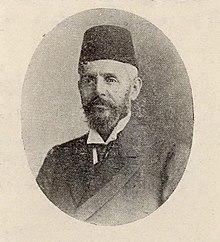Emmanuel Carasso or Emanuel Karasu (1862 in Salonica – 1934 in Trieste) was an Ottoman lawyer and a member of the prominent Sephardic Jewish Carasso family of Ottoman Salonica (now Thessaloniki, Greece). He was also a prominent member of the Young Turks. The name is also spelled Karaso, Karassu, and Karasso. The form Karasu is a Turkification of his name, meaning literally 'dark water'.
Karasu was a member (some sources say founder) and later president of the Macedonian Risorta Masonic lodge in Thessaloniki and pioneered the masonic movement within the Ottoman Empire.[1] Masonic lodges and other secret societies in Salonica were meeting places for sympathizers of the Young Turks, including Talat Pasha.[2] Karasu was one of the first non-Muslim members of the Ottoman Freedom Society, which later became part of the Committee of Union and Progress (CUP); when the CUP came to power, he became the Salonica deputy in the Ottoman parliament.[3] He was offered various positions in the Ottoman government, but turned them down. Karasu was one of the four men who told Sultan Abdülhamid II of his deposition in April 1909. He worked for the cooperation of various Jewish organizations in Turkey, and insisted that Turkish Jews were Turks first and Jews second. He was a member of the committee which negotiated the treaty ending the Italo-Turkish War and of the committee to internationalize the city of Salonika.[4] He lost favor under Atatürk and went into exile in Italy.
Death
He died in 1934, and is buried in the Jewish cemetery in Arnavutköy, Istanbul.
References
- ^ "The History of Freemasonry in Turkey". Archived from the original on May 20, 2006. Retrieved 2015-12-26.
- ^ Marc David Baer, The Dönme: Jewish converts, Muslim revolutionaries, and secular Turks, p. 94 full text
- ^ Ahsene Gül Tokay, "Macedonian Reforms and Muslim Opposition during the Hamidian Era: 1878–1908", Islam and Christian–Muslim Relations 14:1 (2003)
- ^ Stella Salem, ‘Portraits of famous Jewish lawyers and jurists in Greece’, Justice (Special issue: Remembering Salonika) (Spring 1999), 17.
